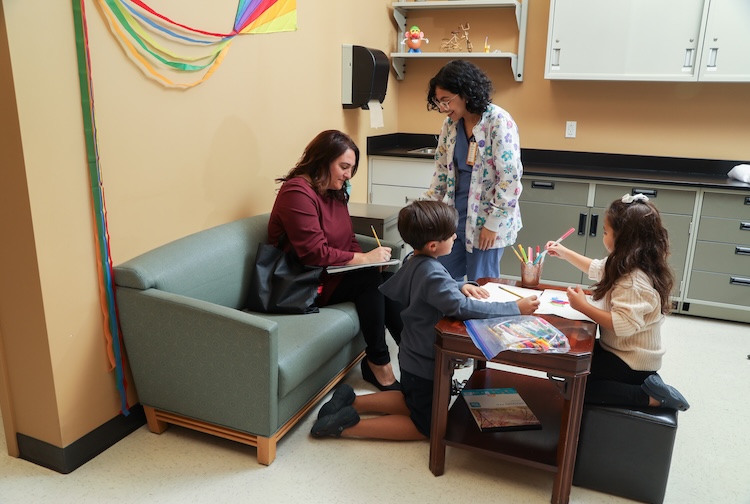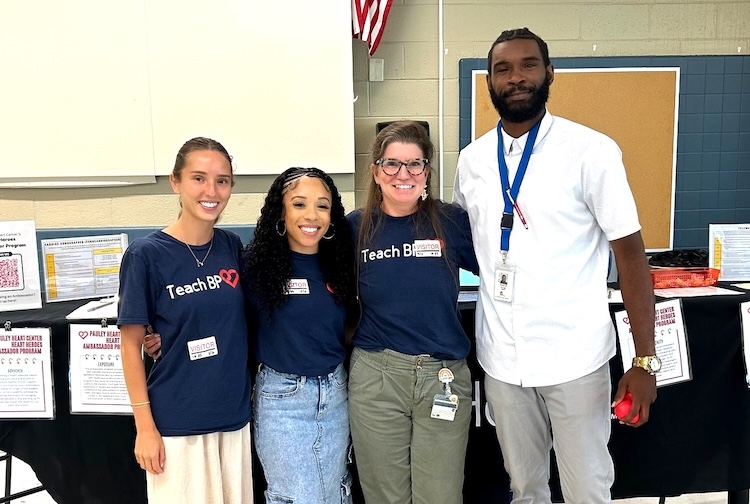Unlocking the puzzle of persistent symptoms of long COVID and POTS in children
VCU researchers investigating the causes of persistent symptoms in two perplexing post-viral conditions in pediatric populations to improve future treatments.
May 27, 2025 VCU researchers looking into connections between the body and brain that may help explain these conditions in pediatric populations. (Caitlin Hanbury, VCU School of Nursing)
VCU researchers looking into connections between the body and brain that may help explain these conditions in pediatric populations. (Caitlin Hanbury, VCU School of Nursing)
By Caitlin Hanbury
Millions of people worldwide experience lingering symptoms following viral infections, including COVID-19. Postural Orthostatic Tachycardia Syndrome (POTS) and Post-Acute Sequelae of SARS-CoV-2 (PASC), commonly known as long COVID, are two such conditions that often present with overlapping symptoms, making them difficult to distinguish and leading to delays in diagnosis and treatment.
In children, POTS commonly manifests as dizziness, lightheadedness and exercise intolerance, which are also frequent symptoms of other viral illnesses, including long COVID. Both POTS and long COVID can worsen after an infection or stressor, further complicating diagnosis.
However, long COVID symptoms can vary significantly with age. In children and adolescents, long COVID often affects multiple body systems, with common complaints of pain, fatigue and sleep difficulties. Research has shown that symptoms differ between age groups: adolescents may experience a loss of smell or taste, while younger children are more likely to report neurocognitive or gastrointestinal issues.
While both POTS and long COVID are linked to autonomic nervous system dysfunction, their underlying causes — and whether they are distinct conditions — remain unclear. This overlap in symptoms can make it challenging for patients to receive an accurate diagnosis and appropriate treatment.
Patients with both long COVID and POTS often experience long delays in receiving appropriate diagnoses and care because their symptoms are ‘hidden.’ These patients often look healthy, and yet, they are experiencing debilitating symptoms that clinicians struggle to adequately treat.
Patricia Kinser, Ph.D., dean of the VCU School of Nursing
With funding from the National Institutes of Health’s Researching COVID to Enhance Recovery (RECOVER) Initiative (NIH Agreement 1OT2HL156812) and support from their pathobiology research program, researchers at Virginia Commonwealth University are investigating the brain-body connections that may help explain these conditions in pediatric populations.
“Patients with both long COVID and POTS often experience long delays in receiving appropriate diagnoses and care because their symptoms are ‘hidden.’ These patients often look healthy, and yet, they are experiencing debilitating symptoms that clinicians struggle to adequately treat,” said Patricia Kinser, Ph.D., dean of the VCU School of Nursing and one of the researchers involved with the study. “Our traditional health care and research models are focused on organ systems, rather than integrative science. The time is now to change this model and to clarify fundamental brain-body circuit abnormalities that may underlie these two conditions.”
Investigating the overlap
An interdisciplinary team will investigate potential connections between long COVID and POTS within the autonomic nervous system — the body's autopilot for essential functions like heart rate, blood pressure and digestion. The team brings expertise from nursing, neurology and pediatrics, with key researchers including Kinser, Amy Salisbury, Ph.D., professor and associate dean of research in the School of Nursing, Gisela Chelimsky, M.D., professor in the School of Medicine’s Department of Pediatrics and chief of pediatric gastroenterology at Children’s Hospital of Richmond at VCU and Thomas Chelimsky, M.D., professor in the School of Medicine’s Department of Neurology and director of the Comprehensive Autonomic Program and Autonomic Laboratory.
Researchers will analyze data from two initiatives: NIH RECOVER, which aims to better understand, diagnose, prevent and treat long COVID and an existing POTS study funded by the NIH, focused on adolescent populations.
Their analysis seeks to uncover whether long COVID and POTS share similar underlying causes in children and adolescents. Specifically, the study will investigate whether both conditions are connected by a dysregulation in the autonomic nervous system, where the body misreads or overreacts to stress or trauma, whether triggered by an illness like COVID or other factors.
We are testing the hypothesis that long COVID and POTS both reflect an altered brain-body mode of operation... In this project, we will also determine if the mode of operation is the same for long COVID and POTS or different.
Thomas Chelimsky, M.D., professor in the VCU School of Medicine and director of the Comprehensive Autonomic Program and Autonomic Laboratory
The research team proposes that both conditions may stem from a failure to reset neural threat pathways activated in response to various forms of trauma, whether from an infection like COVID-19 or a psychological stressor such as an adverse childhood event.
“We are testing the hypothesis that long COVID and POTS both reflect an altered brain-body mode of operation,” Thomas Chelimsky said. “Specifically, we believe that both of these disorders occur when ‘emergency operation’ (fight or flight) is initiated by the periaqueductal gray region of the brain in response to trauma and the system fails to reset once the threat has passed and the person has survived the threat. In this project, we will also determine if the mode of operation is the same for long COVID and POTS or different.“
Given that there is currently no standardized treatment for either condition and symptoms often fluctuate or progress over time, this research is crucial for identifying shared mechanisms and developing targeted therapies.
Uncovering patterns and exploring connections
Studies show that approximately 2% to 5% of children who contract COVID-19 experience lingering symptoms, underscoring the need for a better understanding of post-viral conditions in younger populations. In recent years, the incidence of POTS has risen, particularly among women and teenagers, with many cases emerging after an illness.
“Our current thought is that these disorders are disorders of the brain, in which the fight or flight response is activated and persistent with a decrease in the vagal modulation, which keeps the homeostasis in the body,” Gisela Chelimsky said. “The vagus is a very important nerve that innervates many organs in the body and also plays a role in decreasing inflammation. To understand the role of the brain and the vagus, we will perform an MRI of the brain to see how the brain connects and also look at inflammation in the brain.”
Ultimately, by identifying shared mechanisms between long COVID and POTS, the researchers hope to develop new diagnostic tools and treatments that could address both conditions. This integrated approach has the potential to uncover unified treatment strategies, offering new hope for improved outcomes and a better quality of life for those affected by these persistent and debilitating symptoms.
“Comparing the biological, neurological and physiological systems involved in these conditions could help us identify the underlying mechanisms contributing to the symptoms that patients experience,” Salisbury said. “If we can understand these mechanisms and how they might differ between these two conditions, then we can develop precise treatments targeting the cause of the symptoms. This would allow for earlier effective therapies that would significantly reduce the chronic nature of these illnesses and improve the quality of life.”
VCU-led research consortium identifies distinct long COVID symptoms in children and teens
Learn more about our innovative researchers and their projects




